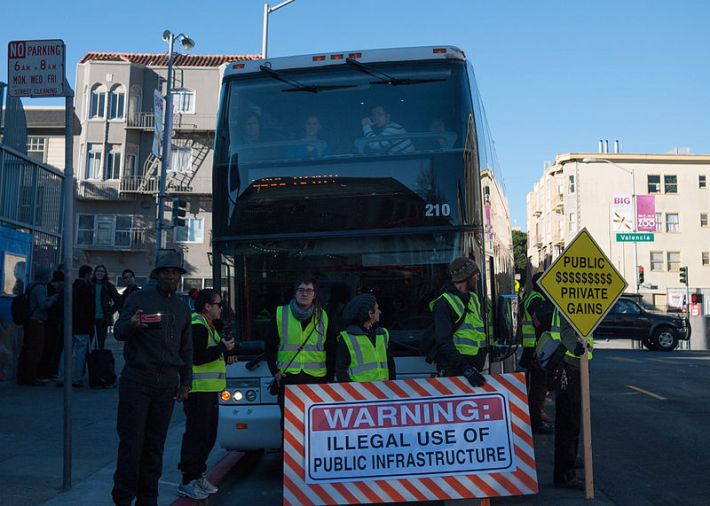
At yesterday's San Francisco Board of Supervisors meeting, supervisors again discussed stopping Tech Shuttles from using Muni bus stops, and voted to instruct SFMTA to study sending them to special hubs instead. Under this plan, tech workers, it is hoped, would use Muni buses to connect to these hubs.
The resolution was supported by board President London Breed and supervisors Jane Kim, David Campos, Norman Yee, John Avalos, Eric Mar, and Aaron Peskin.
“Shuttle hubs are a bad idea if our goal is (as it should be) to get people to use buses instead of cars,” wrote Scott Wiener, who opposed the resolution, in an email to Streetsblog. “Shuttle rides from San Francisco to the Peninsula can be an hour and a half each way, or longer. To add one or two Muni rides each way could easily add an hour or more of daily commuting time. Moving toward a hub model guarantees the decline of the shuttle system, as many shuttle riders will shift to driving.”
Wiener also questioned the logistical practicality of the hubs. "I'm not sure where my colleagues think they're going to site mega bus stops with 100+ buses stopping there during rush hour. I don't know anyone who would want that in their neighborhood."
If adopted, this would replace a pilot plan, which some supervisors wanted to make permanent, that had the shuttles using Muni stops for a nominal fee. Meanwhile, SEIU 1021, a labor union aligned with Google bus protesters, is suing to stop the buses from using Muni stops. Under the hub system, if adopted, tech workers would catch their coaches in parking lots in the South of Market Area.
It was almost a year ago that protests against "Google Buses," as the privately run motor coaches are often called whether they belong to Google or not, had reached their apex. In previous articles, Streetsblog addressed the connection housing advocates make between the buses and San Francisco's housing woes. But as pointed out in a previous post, the most likely outcome of jamming up these buses is that tech workers will buy private cars instead, causing more traffic and pollution. But here we go again, with a bus blocked by protesters at 24th and Valencia yesterday.
So, what's behind this lawsuit against the buses, anyway? There's a tendency in the Bay Area to vilify tech workers and the industry, spelled out in Conor Friedersdof's recent piece in the Atlantic. Surely, the influx of workers that come with the tech boom--or any boom, really--is going to increase demand for housing. So, yes, they've contributed to the demand for housing and driven up prices. The only answer is to build housing--lots and lots of housing. At least that was the conclusion of a recently released report from the Legislative Analysts Office. Streetsblog's sister publication, Santa Monica Next, took a look at the study and what it says about housing statewide.
That said, does anyone really expect a highly paid tech worker to wait for a city bus to travel to a central location, and then board a tech shuttle for a long ride to San Mateo or Palo Alto? It seems more likely they will call an Uber or Lyft to get to the hub. Or, possibly, as Wiener argues, they will buy cars and drive directly to the Apple, Google, and Facebook campuses, further traffic-clogging and polluting the region.
Or there's a third possibility: the tech industry might get fed up and leave the Bay Area all together--taking the economy with it.




